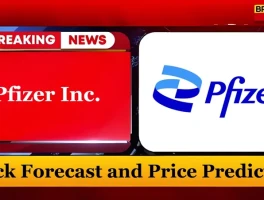Peeling Back the Layers of Pfizer's Q3 Report
Okay, let's dive into Pfizer's Q3 2025 earnings. At first glance, the headline numbers seem… fine. Revenue down 7% operationally year-over-year to $16.7 billion. Not great, but the non-COVID portfolio grew 4%. So, is Pfizer successfully pivoting away from pandemic-era dependence? That’s the question everyone's asking.
Digging deeper, the reported diluted EPS (earnings per share) was $0.62, while the adjusted EPS was $0.87. That discrepancy is always a red flag. What’s lurking in those adjustments? Turns out, a one-time $1.35 billion charge related to an in-licensing agreement with 3SBio, Inc., with an unfavorable impact of approximately $0.20. (In-licensing, for those not in the know, is when a company pays for the rights to develop and sell a drug that another company initially created). That's a hefty chunk of change. Is it a smart strategic move, or just a way to massage the numbers?
Pfizer reaffirmed its full-year revenue guidance of $61.0 to $64.0 billion and even raised and narrowed its full-year adjusted diluted EPS guidance to a range of $3.00 to $3.15 (previously $2.90 to $3.10). Confidence or clever maneuvering? It's hard to say for sure, but my analysis suggests it's a bit of both. They’re managing expectations, but they're also benefiting from cost-cutting initiatives. According to Pfizer (NYSE: PFE) posts $16.7B quarterly revenue; reaffirms 2025 revenue guidance - Stock Titan, Pfizer is holding steady on their 2025 revenue projections.
Cost Savings: The Real Story?
Pfizer is touting $7.2 billion in overall anticipated net cost savings from previously announced cost improvement initiatives by the end of 2027. That's a significant sum, and they seem to be on track. They’re also quick to point out that third-quarter cost of sales decreased as a percentage of revenues compared to Q3 2024, driven by a favorable revision of accrued royalties, a favorable change in sales mix, and lower amortization from the step-up of acquired inventory.
But let’s be real: cost-cutting alone doesn’t drive long-term growth. It’s a tactic, not a strategy. What about innovation? Pfizer invested $7.2 billion in internal research and development projects during the first nine months of 2025 and about $1.6 billion in business development transactions, primarily the 3SBio deal. The Metsera acquisition, for $4.9 billion plus potential milestone payments, also signals a continued appetite for external innovation.

However, the lawsuits against Metsera and Novo Nordisk raise some eyebrows. (A temporary restraining order? Someone's feeling litigious). It suggests a level of desperation to secure that acquisition, or at least to prevent a competitor from getting it. Was Metsera that crucial to Pfizer's long-term strategy, or is this just a power play?
It's like watching a chess game where one player is aggressively sacrificing pawns (cost cuts) to control the center of the board (future innovation). Is it a winning strategy, or will they run out of pieces?
Pipeline Progress: A Mixed Bag
Pfizer announced some positive clinical trial results, including the HER2CLIMB-05 trial for metastatic breast cancer and the EMBARK study for prostate cancer. These are genuinely good news stories, offering hope for patients and potential revenue streams for Pfizer. On the other hand, the THRIVE-131 study for sickle cell disease didn't meet its primary endpoint. That's the nature of drug development – you win some, you lose some. But it underscores the risk and uncertainty inherent in the pharmaceutical business.
And this is the part of the report that I find genuinely puzzling: the share repurchase program. As of November 4, 2025, Pfizer’s remaining share repurchase authorization is $3.3 billion, but current financial guidance does not anticipate any share repurchases in 2025. Why not? They’re sitting on billions, the stock price isn't exactly soaring, and they’re not buying back shares? It suggests they’re either saving that cash for something bigger (another acquisition?) or they lack confidence in their near-term prospects.
A Calculated Gamble?
Pfizer’s Q3 2025 report is a mixed bag, to be sure. There are glimmers of hope in the non-COVID portfolio growth and the potential of new drugs in the pipeline. But there are also warning signs in the cost-cutting measures, the legal battles, and the lack of share repurchases. It feels like a calculated gamble, where Pfizer is betting that aggressive cost management and strategic acquisitions will offset the decline in COVID-related revenue and drive future growth. But the outcome is far from certain.



